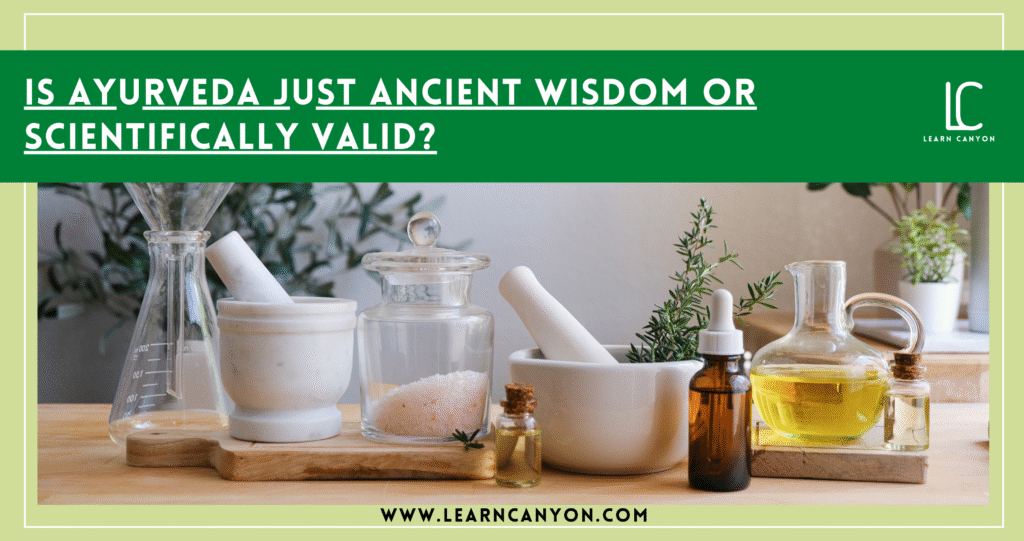A 5,000-Year-Old System in a Modern World
As a formulator who’s deeply rooted in both science and nature, I’ve always found myself at the intersection of tradition and evidence. Ayurveda, with its rich 5,000-year-old heritage, has fascinated the world with its holistic approach to health, beauty, and wellness. But with so many modern consumers asking, “Is this really scientifically proven?”, it’s a question worth unpacking.
In today’s world of ingredient transparency and clinical claims, ancient systems like Ayurveda often get viewed with skepticism. And honestly? I understand why. We’re taught to trust studies, data, and double-blind trials. But does that mean everything outside that lens is less valid?
This blog is not about defending Ayurveda blindly. It’s about exploring it curiously. Let’s journey through what Ayurveda truly is, what science has to say, where the gaps lie, and whether this ancient system has a credible seat at the modern formulation table.
What Exactly Is Ayurveda? A Quick Recap
Before we talk science, let’s take a moment to truly understand what Ayurveda is, because it’s more than just herbs and hair oils.
Ayurveda, translated as “the science of life,” is a holistic healing system that originated in India over 5,000 years ago. At its core, Ayurveda is all about balance, balance within the body, the mind, the environment, and even the seasons. It’s not about chasing trends or quick fixes; it’s about tuning into your unique constitution, or Prakriti, and living in a way that supports long-term health and harmony.
Everything in Ayurveda starts with the three doshas, Vata, Pitta, and Kapha. These biological energies govern how our bodies function, how we respond to stress, how our skin behaves, and even how we age. When your doshas are in balance, you feel vibrant, resilient, and grounded. When they’re out of sync, that’s when dis-ease (or imbalance) starts to show up.
And what I love most as a formulator? Ayurveda doesn’t isolate the skin from the rest of the body. Skin issues, hair fall, pigmentation, all of it is connected to digestion, sleep, emotions, and lifestyle. So when I formulate using Ayurvedic principles, I’m not just mixing ingredients. I’m crafting a ritual that supports deeper wellness from the inside out.
So no, Ayurveda isn’t just “old-school.” It’s deeply intuitive. It’s personalized. And it’s beautifully layered, something modern science is only beginning to catch up with.

The Western Lens: What Does “Scientifically Proven” Mean?
Let’s talk about the phrase we hear all the time, “scientifically proven.” Sounds solid, right? But what does it actually mean?
In the modern, Western scientific world, something is considered “proven” when it has gone through rigorous testing, typically large-scale, double-blind, placebo-controlled clinical trials that are peer-reviewed and repeatable. In short, science looks for consistency, predictability, and evidence that can be measured and reproduced.
Now, as a formulator trained to read research papers and evaluate ingredients based on clinical data, I deeply respect this approach. It’s helped us understand molecular structures, bioavailability, and safety profiles at levels ancient systems never had tools to measure. But, and this is a big but, this model doesn’t always capture the full picture, especially when it comes to holistic, individualized systems like Ayurveda.
Ayurveda wasn’t developed in labs; it evolved through observation, lived experience, and an intimate relationship with nature over millennia. It’s not just one herb, one outcome. It’s about how a blend of herbs works synergistically in your body, based on your constitution, diet, climate, and lifestyle. That’s incredibly hard to “prove” in the rigid structure of clinical trials designed for single-variable testing.
So when someone says, “There’s no scientific proof for Ayurveda,” what they often mean is: It hasn’t been studied enough in the Western model. And that’s a very different statement than saying it doesn’t work.
As formulators, we’re in a beautiful position to bridge these worlds, honoring the science, but also respecting the centuries of wisdom that came long before it.
Where Ayurveda Meets Modern Science
Now here’s where things get exciting, because while Ayurveda is ancient, it’s not stuck in the past. In recent years, more and more researchers have started paying attention to the herbs, techniques, and holistic principles Ayurveda has championed for centuries. And guess what? Some of the findings are incredibly validating.
Let’s take a few standouts:
- Ashwagandha – This adaptogenic root, used in Ayurveda for stress and vitality, has been clinically shown to reduce cortisol levels and improve resilience to anxiety and fatigue. It’s even showing up in nootropic stacks and performance blends now, hello, modern biohackers!
- Turmeric (Curcumin) – Probably the most famous Ayurvedic herb globally, curcumin has been studied extensively for its anti-inflammatory and antioxidant effects. From joint pain to skin conditions, there’s growing evidence backing what Ayurvedic practitioners have known for generations.
- Triphala – This gentle but powerful digestive formula (a blend of three fruits) is now being recognized for its impact on gut health, microbiome diversity, and even antioxidant capacity. Science is beginning to echo Ayurveda’s view of digestion as the root of all health.
- Brahmi (Bacopa monnieri) – Revered as a brain tonic, Brahmi has been shown to enhance memory, cognitive function, and even help reduce symptoms of ADHD and anxiety in clinical studies.
What’s interesting is that many of these herbs are now being isolated, extracted, and standardized for active compounds. While that’s helpful in research, it also slightly misses the point, Ayurveda never looks at a plant in isolation. It values the synergy of the whole herb, the timing of its harvest, how it’s processed, and how it interacts with you.So yes, science is starting to catch up, and that’s a beautiful thing. As a formulator, I find it thrilling to work with ingredients that are backed by both ancient wisdom and emerging evidence. It adds depth, dimension, and credibility to our craft.

What’s Still Lacking in Research?
Let’s be real for a moment, while Ayurveda has some solid scientific backing in places, we’re not quite there yet across the board. And as much as I deeply respect this system (and use it in my own formulations!), I think it’s important to acknowledge where the research still falls short.
First, there’s the issue of scale and consistency. Most Ayurvedic studies are either small in sample size, lack placebo control, or are done on animals. That makes it hard to confidently say, “This works for everyone.” And because Ayurveda is so individualized, that kind of blanket testing is a challenge in itself.
Then, there’s the standardization struggle. Imagine trying to test the effect of something like Triphala, when every manufacturer might be using slightly different sourcing, ratios, or drying methods. Modern science loves uniformity, but Ayurveda thrives in customization, and that makes it tricky to pin down in a lab setting.
Also, many Ayurvedic remedies are multi-herb formulations, designed to work synergistically. But clinical trials often test one active at a time. That reductionist approach, while useful for isolating effects, can overlook the way these herbs work in harmony, which is the whole point of Ayurvedic formulation!
And of course, there’s the funding and institutional bias. Most scientific research is funded by pharmaceutical companies or Western institutions with little incentive to study traditional herbal systems unless there’s a commercial angle. So naturally, some of the most powerful Ayurvedic remedies just haven’t had their moment under the microscope yet.
But that doesn’t mean they’re ineffective, it just means the research is still catching up. And as someone who formulates from both a traditional and evidence-based lens, I believe we’re entering a time where these gaps will slowly close, especially as more integrative practitioners and scientists turn their eyes toward Ayurveda with curiosity instead of skepticism.
Does Lack of Western Validation Mean It’s Invalid?
This is the heart of the conversation, isn’t it? If Ayurveda hasn’t been fully validated by Western science yet… does that mean it’s invalid?
Honestly? Not at all.
See, we need to understand that Western validation is just one way of measuring knowledge. It’s powerful, yes. It gives us structure, reproducibility, and measurable outcomes. But it also has limitations, especially when it comes to systems that are experiential, intuitive, and designed to treat the individual, not just the disease.
Ayurveda doesn’t operate in a one-size-fits-all model. It doesn’t isolate one compound to treat one symptom. It sees the whole person, your skin, your digestion, your emotions, your lifestyle. That’s not always something you can fit into a lab-controlled, double-blind study. And that’s okay.
Think about it: for years, practices like yoga, acupuncture, and meditation were seen as “woo-woo” by the scientific world. Now? They’re prescribed in hospitals. Validated by studies. Backed by neuroscience. It just took time for the research to catch up with what ancient systems already knew.
So no, lack of Western approval doesn’t make Ayurveda any less wise or worthy. It just means it hasn’t been translated fully into a language science understands, yet.
As a formulator, I’ve seen firsthand how Ayurvedic ingredients and rituals can transform skin, calm the mind, and bring people back to balance. And when we approach this ancient system with both respect and a spirit of inquiry, we create space for something powerful, a truly integrative approach to wellness that honors both tradition and innovation.
The Rise of Integrative Medicine
Now here’s the part that makes my formulator’s heart truly happy, we’re no longer stuck choosing between ancient wisdom and modern science. We’re learning to blend them. And that’s the sweet spot where integrative medicine is thriving.
Integrative medicine is exactly what it sounds like, a thoughtful combination of conventional Western practices with complementary systems like Ayurveda, Traditional Chinese Medicine, naturopathy, and more. It’s not about replacing science with tradition. It’s about enhancing care by pulling from both toolkits, with the patient (or client) at the center.
We’re seeing Ayurvedic herbs showing up in dermatology clinics. Ashwagandha in stress-relief supplements prescribed by functional medicine doctors. Turmeric and Neem in clinical skincare lines. And guess what? Consumers love it. They’re hungry for products that are not only effective, but also feel meaningful, products rooted in culture, story, and self-care rituals.
In my own formulation journey, I’ve worked with clients and students who want evidence-based skincare that still honors their roots. They want serums infused with Triphala and face oils inspired by traditional Abhyanga massage. And they want to know it’s safe, effective, and purposeful. That’s where integrative thinking becomes powerful, because it allows us to bring the best of both worlds together.
This shift isn’t just happening in wellness circles, it’s happening in hospitals, research labs, and regulatory conversations too. And as formulators, educators, and wellness professionals, we have a beautiful opportunity to lead that bridge-building. To show that tradition and innovation are not at odds, they’re allies.

What This Means for You as a Skincare or Wellness Formulator
So now that we’ve walked through the science, the gaps, and the growing integration, let’s bring it back to you, the formulator.
What does all of this mean when you’re crafting a face cream, a herbal serum, or a wellness blend inspired by Ayurveda?
It means you get to stand at the edge of something truly transformative. You’re not just making products, you’re carrying forward a legacy. And when you blend that ancient knowledge with a modern, safety-first mindset, you create formulations that are not only effective but deeply meaningful.
You also have a responsibility. As a formulator using Ayurvedic ingredients, you need to:
- Know your herbs inside out, their traditional uses, energetics, and safety profiles.
- Stay current with available scientific research, even if it’s limited, and be honest about what is proven and what’s traditional.
- Source ethically and sustainably, because Ayurvedic ingredients aren’t just commodities, they’re sacred in the cultures they come from.
- Educate your customers or clients. Help them understand that “scientifically proven” doesn’t always mean “the only truth.” Teach them about synergy, intention, and holistic care.
The beauty industry is shifting. It’s no longer just about sleek packaging and quick results. People want to connect with the why behind a formula. They want wisdom. They want transparency. And Ayurveda, when practiced respectfully and knowledgeably, offers all of that in abundance.
So go ahead, infuse your balms with Brahmi, your toners with Tulsi, your oils with Ashwagandha. But do it with both reverence and research. That’s how we honor the past and shape the future.
Conclusion
If there’s one thing I’ve learned through years of formulating, researching, and teaching, it’s this: wisdom isn’t fixed. It evolves. Just like our understanding of Ayurveda is evolving today.
For centuries, Ayurveda has offered a deeply intuitive way of living and healing. And now, with modern science beginning to catch up, we don’t have to choose between ancient and modern. We can stand in the beautiful middle ground where tradition inspires us and evidence informs us.
As formulators, we’re not just blending ingredients, we’re blending philosophies. Every oil, extract, and infusion becomes a bridge between time-tested practices and today’s standards of safety, transparency, and efficacy.
So no, Ayurveda isn’t outdated or irrelevant. It’s a living system, rich with wisdom that’s still unfolding, still being rediscovered, and still deeply needed in our world of quick fixes and disconnected care.
Let’s continue to learn, to question, to experiment, and most of all, to formulate with heart and intention. Because when we do, we’re not just creating products. We’re creating experiences that respect the past and elevate the future.











